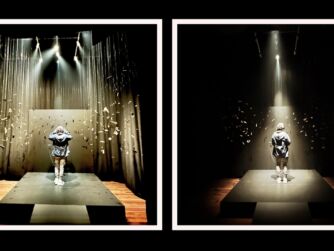 One of the most common reactions that I hear after giving someone their first VR experience is “Oh my God! This is going to change everything. Imagine how this will change education!” David Whelan & Mike Armstrong are doing just that with Lecture VR, which is a social multi-player edutainment platform that they’re building starting from the Riftmax Theater social VR technology stack. Their goal is to recreate the educational system that was portrayed in the sci-fi novel Ready Player One.
One of the most common reactions that I hear after giving someone their first VR experience is “Oh my God! This is going to change everything. Imagine how this will change education!” David Whelan & Mike Armstrong are doing just that with Lecture VR, which is a social multi-player edutainment platform that they’re building starting from the Riftmax Theater social VR technology stack. Their goal is to recreate the educational system that was portrayed in the sci-fi novel Ready Player One.
David is probably most well-known for his Virtual Reality Reviewer website, but after watching and reviewing hundreds of VR apps he’s starting to create his own experiences with Immersive Education company.
One of first experiences that they are creating is The Apollo 11 VR experience that was successfully funded through Kickstarter.
 David and Mike talk about their vision for creating both live lectures in VR as well as pre-recorded lectures that may have a live interactive Q&A session afterward. David says that they completion rate for the online open courseware classes are actually pretty low, and they’re hoping that recording the more of the body language of the lecturer will make it more immersive and engaging.
David and Mike talk about their vision for creating both live lectures in VR as well as pre-recorded lectures that may have a live interactive Q&A session afterward. David says that they completion rate for the online open courseware classes are actually pretty low, and they’re hoping that recording the more of the body language of the lecturer will make it more immersive and engaging.
They’re also hoping to create a much more social learning experience. Whereas a lot of open courseware classes have online chat forums, they’d like to have ongoing classes where the students have a chance to interact with each other in real-time.
To me the educational opportunities with VR is one of the most exciting potentials for what VR has to offer, and the team at Immersive Education are certainly on the leading edge of creating a platform for social learning experiences. It’ll be exciting to see how their efforts will evolve, especially when I see reactions to their Apollo 11 experience like this one from YouTuber “Hoopermation”
Become a Patron! Support The Voices of VR Podcast Patreon
Theme music: “Fatality” by Tigoolio
Subscribe to the Voices of VR podcast.
Rough Transcript
[00:00:05.452] Kent Bye: The Voices of VR Podcast.
[00:00:12.034] Mike Armstrong: I'm Mike Armstrong. I started doing Riffmax, but we're working on an education project now. And the one I'm working on with Dave here is called Lecture VR. And it's a social multiplayer learning experience where you're sitting in a classroom with other students and learning with effects and immersive, I think we call it edutainment, right? Because you're entertained while you're being educated.
[00:00:34.810] David Whelan: I am Dave Whelan, I'm probably most famous for being the editor-in-chief of Virtual Reality Reviewer and we recently ran a Kickstarter for the Apollo 11 project but I'm here obviously promoting Lecture VR which is pretty much the education system from Ready Player One.
[00:00:50.240] Kent Bye: Oh, wow. So the education system from Ready Player One, that's quite a pitch. So what does that encompass? Because when I think of VR and education, I think of you can go on a field trip at any time. So what type of things are you actually implementing? Maybe some examples and concrete things that you're starting to put together.
[00:01:06.300] Mike Armstrong: I mean it's a real school that you could walk around and like go to the different classrooms if they have different lectures going but right now like in the demo we have a standard lecture hall that will take you places in the lecture so right now we have one that's Neil deGrasse Tyson you know but we could have Einstein you know teaching theory of relativity and you're watching things happen in front of you being immersed by it and We can actually take them on a ride into these places like outer space or into caves in different environments.
[00:01:42.275] David Whelan: It's not just recorded lectures, there's also live lectures as well. So somebody could be wired up and have hydras, they can go in and give a live lecture and then our software will actually record that lecture. the person who gave the lecture can sit down from the student's point of view and actually watch that lecture replayed so it'll be a quite strange experience and we're hoping that this is going to be released free to educators all over the world so what we want to do is we want to provide the best education by the best teachers to everybody in the world to make it available because if you wanted to say go to Berkeley there's only a limited amount of spaces and it costs a lot of money Whereas if the Berkeley educators went onto our system and provided those courses, anybody in the world can take those courses. So you can kind of pick and choose what educators you want. So we want to make it available for everybody.
[00:02:24.319] Kent Bye: Now I know that MIT has their open courseware and there's a number of different universities that have provided video lectures of these really popular professors talking about all sorts of whole range of different topics. So what is it that makes it different about what you're trying to do and put it into virtual reality that kind of transcends the limitations of just having a video of a professor giving a lecture?
[00:02:44.764] David Whelan: Yeah, so those online courses, the MOOCs, so typically you'll get maybe 10-15,000 people to sign up for an online course and only 3% of people will finish it because it's very impersonal. You're just looking at a video, it's not very engaging and you'll only get to see maybe the top half of the person in a video, whereas in virtual reality it's a lot more animated. So when the avatar is there and it's moving their head or their arms are moving, there's a lot to be said with teaching. And body language conveys a message a lot clearer than just looking at a video. So it's a lot more engaging. And then we have 4D effects. So as Mike was saying, if, say, a scientist was talking about the effects of gravity, we could drop out the room, you're out in space, there'd be a black hole in front of you and you can see a star getting swallowed up by it. So we feel it's going to be a lot more engaging and it'll keep people not just educated, but it'll keep them entertained as well.
[00:03:31.367] Mike Armstrong: In a way, it's taking that same concept with the videos and putting you into it. So you actually feel like you're there, you know, after you get the headset on, you get into it and you're there with other people. You actually feel like you're in that lecture hall as opposed to just watching it on a screen. So that's what VR is about, right? Just putting us into these things, you know.
[00:03:51.810] David Whelan: But social learning, we think, is going to be massive. So the MOOCs kind of pushed out that, oh, we have social learning. But it's all message boards. So you could put a message up on a board, and it might take three days to get a response. Whereas with virtual reality, if you're actually creating a meeting space where people can meet up and actually talk with each other, you will actually learn with your peers. And you'll make an effort to actually be there on time instead of just putting stuff up on a form. Because it's very impersonal, and you don't know the kind of response. Whereas if you're standing next to an avatar, they're talking back at you, it's a lot more engaging.
[00:04:20.803] Kent Bye: It's really interesting because there's a lot of just go-at-your-own-pace learning that doesn't require you to be at the same time and place as other people. So you're really trying to have these live interactions with both the teacher, is the teacher live or is it recorded, and also the students?
[00:04:37.088] David Whelan: Yeah, well it's going to be both. So the teacher can actually log in live if they'd like or else they can use one of the canned lectures that they've created and they can log in at the end of class and just take questions and answers because sometimes, like, you'd want a teacher to be on their A game all the time but that doesn't happen. Sometimes they go out, they might have a few drinks, they might have like a family party or whatever, so they can record their best A-level lecture and then just log in at the end and take questions and answers, you know, so it'll be useful.
[00:04:58.177] Mike Armstrong: They could be sitting at the professor's desk watching their own recorded lecture while he's in there with the students and then at the end, question and answer period, so... But at least he doesn't have to put on that performance 50 times a day, but he can have that recorded experience for himself, you know.
[00:05:12.981] Kent Bye: Yeah, so it sounds like you're kind of taking the lessons of the Riffmax Theater social experiences and then creating kind of like these social learning environments. And so what are some of the things that you are taking from that previous experience of making Riffmax and putting into this experience now?
[00:05:27.511] Mike Armstrong: I mean, a lot of that crosses over. I mean, we had the laser pointers and just the interaction with people, all of the same concepts transfer over. I mean, it became like a stage and in a lot of ways, the lecture hall is like a stage and you have a lot of the same elements in there, except we'll have like a whiteboard. I mean, there's a markup feature instead of jumping around in Riff Max and drawing all over the air. just tame some of these concepts and put them into a learning environment. It transfers really well, so.
[00:05:57.744] David Whelan: Oh yeah, it's just with Riftmax, a lot of the core tech, and it's been built, like Riftmax was built over two years, so a lot of the core tech is there and we're just really polishing it up now and making it for education. We see the big future, it is education, we want to push VR to the masses with education. We actually see PlayStation as a really important platform because A lot of students will have PlayStation 4s. They won't have high-end PCs. They'll have PlayStation 4s in their dorms. So we feel like PlayStation will probably sell maybe 5 or 6 million in the first year. So it's a very important platform for us going forward.
[00:06:30.150] Kent Bye: Oh, interesting. So it's interesting to hear people targeting education apps for PlayStation. I'm not sure if I've necessarily heard that so far. Maybe you could talk a bit more about the Apollo 11 experience that you're also creating at the same time.
[00:06:42.362] David Whelan: So the Apollo 11 experience, we're probably more famous for that at the moment because we had a Kickstarter, which was successfully funded. We were working with Drash on that. Drash couldn't be here today because he had a little mini Drash only four weeks ago, his wife, so he would have loved him to be here. We see that as a showcase experience. So inside Lecture VR, if somebody's giving a talk about the Apollo project, we can actually drop out the room and next you're going to be inside the Apollo 11 experience and the teacher's going to say, right, now that we've talked about the Apollo project, now let's experience it for real. They go off on a 40-minute journey and they'll come back. So what we want to do is we want to offer our platform to any other content makers making education experiences. They can actually come on our platform and they can actually embed their experiences inside LectureVR. So it can be on anything. So say if somebody's making an educational product on medicine and somebody's giving a talk about medicine, they can actually load that in from LectureVR. We see it as a showcase experience because it's very hard to get people excited about, oh, we're making lecture VR. It's very hard to excite students about that. But if you tell them, we've made the Apollo 11 experience, and you can go to the moon, they jump out of their seats and go, oh, I want to try that. But we're trying to draw in students to think that, look, VR is very useful for education. Here's the Apollo 11 experience. If you like that, check out lecture VR. And there's going to be loads of other experiences very similar to that.
[00:07:56.760] Mike Armstrong: You could turn the classroom into a spaceship. Let's go on a field trip. It's really convenient.
[00:08:04.501] Kent Bye: So I guess one of the questions that comes up is the whole interactive nature of some of these experiences. So if it's a personal experience like Apollo 11, for example, is this something that if you put somebody in this experience, it's going to be the same every time? Or is there going to be some interactive elements where if they want to dive in to learn a little bit more about some specific element, you may have more information come up about that before you go through? So in the end, it would be everybody would have a different length of experience that they spend in this.
[00:08:32.720] David Whelan: Well, with the lectures, it could be interactive. So if somebody's talking about DNA, we can have strands of DNA appear in front of somebody. They can actually interact with that then with whatever input system that they have and pull it apart and put it back together, you know. So there will be interactive elements, certainly. There should be a lot of other stuff in it as well.
[00:08:46.450] Mike Armstrong: I mean, like the basic physics of everything, it's easy to demonstrate. I mean, there's only so much you could teach about. Well, there's plenty to teach about gravity. I mean, that concept goes on and on. But I mean, Even just using the hand controllers, there's a lot of interactivity with these things. And different notes taking elements.
[00:09:04.375] David Whelan: What could be a neat idea if somebody is talking about gravity, the teacher could stand up and say, right, I'm going to generate a black hole in the center of this room. We're going to see what happens. And everybody just gets sucked into it and gets spaghettified. So you can do very interesting things in VR.
[00:09:18.389] Kent Bye: So what type of experiences do you guys want to have in VR then?
[00:09:22.195] Mike Armstrong: I want to experience everything in VR. I know that day when you can go home from work and then you feel like you're on a Caribbean island somewhere and you're actually tricked into believing you're there. I think that day's coming really soon, you know? And just get completely immersed. Some of the latest hardware we're seeing is just... I mean, it's getting there so quick that I'm just excited about everything, you know? The whole thing.
[00:09:45.539] David Whelan: Well, I just always wanted to walk on the moon, so I said, no one's building it, better build it ourselves. So another two or three months, it'll be out to the public anyway, so I'm looking forward to that.
[00:09:55.348] Kent Bye: Awesome. And finally, what do you guys see as kind of the ultimate potential for virtual reality and what it might be able to enable?
[00:10:03.392] Mike Armstrong: I think it's you know, I mean the Internet's kind of made our world a closer place I mean no longer matters if you're in China or America. I mean everybody's just you feel like you're right there I think it's gonna make the world just like this social experience where It really does. I mean the physical distance between us is not as important. It's all about that interaction I mean, it's just gonna change everything so quick. I mean, it's just really exciting. I
[00:10:28.989] David Whelan: I just think VR, it's non-judgmental. It doesn't care how much money you have in your bank account. It doesn't care what your background is. We can now provide the best education to anybody in the world if they want to be educated. It's just a level playing field. It just resets the bar. There's no social class. Everybody is treated equal. So I think that's the big draw for VR for me, anyway. Awesome. Well, thanks, guys. All right. Thanks a million. Thanks, Ben.
[00:10:51.763] Kent Bye: And thank you for listening. If you'd like to support the Voices of VR podcast, then please consider becoming a patron at patreon.com slash voicesofvr.




